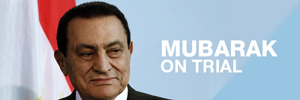Egypt’s Hosni Mubarak appears in court
Former president and sons plead not guilty to charges including corruption and murder.

Hosni Mubarak, the former Egyptian president, has appeared in court to face charges of corruption and the unlawful killing of protesters during the revolution that forced him from power.
“I categorically deny all the charges,” Mubarak said at the trial, held in the capital Cairo, on Wednesday. The ousted president spoke from a hospital stretcher where he lay inside a cage for defendants in the court.
His two sons, Gamal and Alaa, who are also on trial for corruption, denied the charges against them as well. They accompanied their father in the defendants’ cage during the trial.
Mubarak was flown to Cairo for the trial from Sharm el-Sheikh, the Red Sea resort where he has lived since his removal from power.
 |
| Click here for our live blog on the trial |
Wednesday marks his first public appearance since he was toppled in the popular uprising on February 11. The former president’s trial, in a temporary court at the police academy in Cairo, is being screened live on Egyptian state television.
“This is the first time that an Arab leader ousted by his own people is being put on trial by his own people,” Al Jazeera’s Sherine Tadros reported from outside the court in the capital.
“Mubarak is looking very alert,” Tadros said.
“He has dyed his hair black as we normally see him. He is in a bed of course, but I think it will come as somewhat of a surprise to everyone – especially given the reports of his deteriorating and ailing health – that he does look so well and alert at this trial.”
With the case still in its procedural stages, “the senior judge Ahmed Refaat is trying to keep everyone calm and trying to maintain a semblance of authority,” Tadros said.
“He is known as a very authoritative senior figure in the judicial system, he is known also for being very fair and not tied to the old regime.”
Others charged
More than 800 people were killed and about 6,000 wounded in the 18 days of protests that eventually toppled Mubarak’s regime.
As well as Hosni, Gamal and Alaa Mubarak, other former regime officials also face court charges.
Habib el-Adly, Mubarak’s former interior minister, and six senior police officers are being charged with murder and attempted murder in connection with those killed during the uprising.
“Farid el-Deeb, the head lawyer for the defence team is questioning the legality of having these joint trials, of having all of these people matched together, and having all of these charges brought together at the same time,” Tadros reported from outside the court.
Meanwhile outside the court site, a screen was erected to show the trial, and crowds gathered to watch the proceedings.
|
Al Jazeera’s Sherine Tadros reports on the scuffles taking place between protesters outside the court |
Scuffles also took place outside the police academy between Mubarak critics and groups of his supporters, our correspondent reported from the scene.
“Out of nowhere it seemed that dozens of people, probably over a hundred people [were] here throwing rocks at each other despite the very heavy security,” she said.
Riot police then moved in to separate the protesters.
Security remained tight, with barbed wire and hundreds of troops around the compound.
Efforts have been made to ensure spectators in the court are unable to get close enough to the defendants’ cage to yell and throw objects at them, the interior ministry said.
Swift session expected
Al Jazeera, along with a number of other media outlets, has been denied access to the trial by the Egyptian government. Only 10 foreign media outlets are allowed to broadcast from inside the proceedings.
Wednesday’s court session may be over quickly, as in some trials, with charges read and pleas recorded.
Legal experts have said comments by presiding judge Refaat before the trial suggested there might be daily sessions after this to ensure a swift verdict.
“We don’t expect these proceedings to take very long, it is just the opening session,” our correspondent said.
“Essentially the prosecution will read out all the charges that have been levelled against the different defendants and then each one will say their name to prove that they are in fact in attendance in court. And then they will put in their plea, either guilty or not,” she said.
“And at that point, the court case should be adjourned [for the day].”